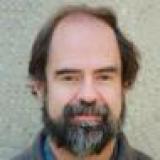
James Gunn
Jim Gunn developed a sense of the vastness of space early in life. The only child of an exploration geophysicist, he was born in Texas in 1938, but he traveled all over the country with his family while his dad looked for petroleum for Gulf Oil. If he managed to spend a full school term in one city, that was a good year; it was just as likely that he'd move after six months.
"I had a very sort of disrupted childhood," he said, though "I don't regret it." It probably helped him to form a boundless perspective on life that has carried into his acclaimed research on the cosmos.
"I was very interested in science as far back as I can remember," Gunn said. "More particularly, I was very interested in astronomy as far back as I can remember. It caught my fancy when I was 7 or 8."
He picked up a primer on astronomy that his dad brought home and read through it when he was only in second grade. It wasn't technical; it was "mostly pictures" he says, but it fired his imagination.
For a brief stint in high school — when he worked on the school paper — he thought about becoming a writer, but science is what stuck.
(No, he is not the same James Gunn who writes science fiction, although students frequently assume he is. "I like his stuff, actually, some of it.")
By 1961 Gunn had earned his Bachelor's Degree in physics and mathematics from Rice University and in 1966 he completed his PhD in astronomy and physics at the California Institute of Technology. His thesis was "On the Statistical Distribution of Galaxies in Space and Some Cosmological Implications."
His star rose quickly. In the late ‘60s and early ‘70s, he was a visiting professor, assistant professor and then full professor. He taught at the University of California, Berkeley, Princeton University, the University of Washington and California Institute of Technology. His research was garnering widespread respect and he was announcing new and sometimes astounding theories.
"There were some older guys" in astronomy who were a bit resistant to the new ideas, Gunn said. "But by that time, the field had grown enough and become sort of youth-heavy so we didn't feel sat-upon by the older generation."
He is perhaps best known for his work as deputy principal investigator with the wide field/planetary camera for the Hubble Space Telescope (1977-1991) and as project scientist (1991-forward) for the Sloan Digital Sky Survey (SDSS), as well as several years as technical director for SDSS. He has received a number of awards, including the Gold Medal, Royal Astronomical Society, London; the Petrie Prize, Canadian Astronomical Society; the Russell Lectureship, the Dannie Heinemann Prize for mid-career accomplishment and the Joseph Weber Award, American Astronomical Society; and the Distinguished Alumnus Award from both California Institute of Technology and Rice University. He is currently a professor of astrophysical sciences at Princeton.
He is married to a fellow astronomer, Dr. Jill Knapp. The couple adopted a son, Humberto, and a daughter, Marleny, from Peru in 1991, when Gunn was 50. "It was an adjustment," he said. "It was delightful."
Colleagues are fond of pointing out that Gunn is unusual in that he has distinguished himself in all three areas of astronomy research: theory, observation, and instrumentation. "Instrumentation in many ways has been the most challenging," he said. He was introduced to machinery early on. His father had to provide much of his own machinery for his work, and Gunn followed suit. "I've sort of done that all along," he said, but he has concentrated on instrumentation in recent years.
"I'm not sure about my next project," he said. "I'll be 70 in three years," indicating he may be ready to take a supporting role on whatever it is. And whatever it is, it will be "almost certainly cosmological."
Gunn worries about the future of astronomy research. The field is vast and funding is tight. "You can't get much more un-applied than astronomy, so it's hard to convince pragmatic thinkers — including Members of Congress — of the necessity of spending money on research. The questions about the cosmos have become increasingly difficult and expensive to answer," he said. "I wonder if the field has thought enough about what it really needs to know."
Funding issues and practical applications aside, Gunn has absolute certainty about why we must continue to search the skies: "because we're sentient, curious people and it's important to our humanity to learn where we came from and where life came from… What these things do is underscore the fact that we should be humble… We shouldn't lose sight of the larger context."

